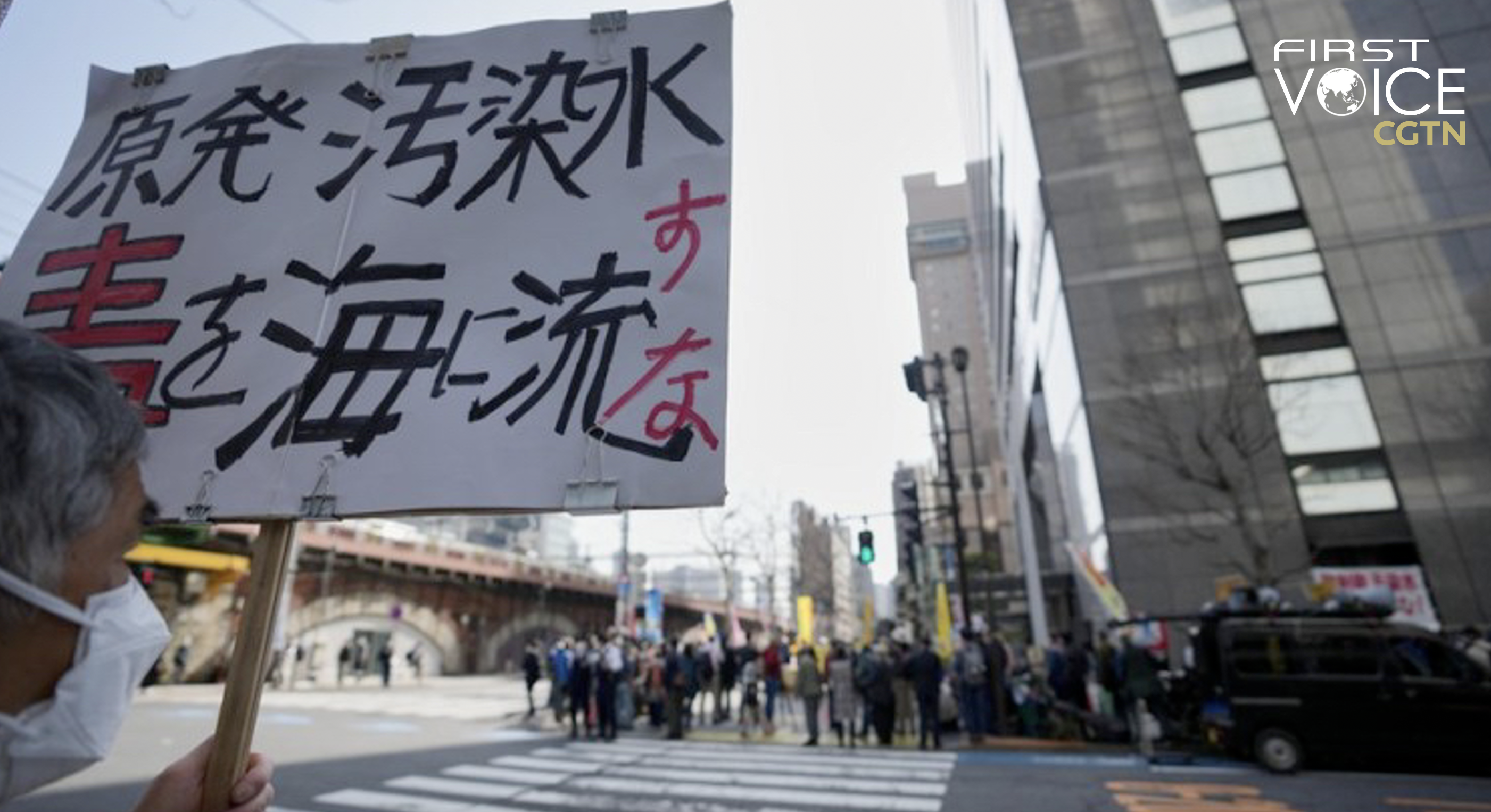
Editor's note: CGTN's First Voice provides instant commentary on breaking stories. The column clarifies emerging issues and better defines the news agenda, offering a Chinese perspective on the latest global events.
By Yu Hong
A 21-member team of South Korean experts is visiting Japan to inspect safety of the waste water contaminated by radioactive substances from the Fukushima Daiichi nuclear power plant.
In April 2021, the Japanese authorities announced the plan to discharge the contaminated water into the sea after treatment using the Advanced Liquid Processing System (ALPS).
The plant's operator, the Tokyo Electric Power Company (TEPCO), and the Japanese authorities have been playing down the potential consequences of the discharge plan to the environment and public health. Japan claims that the nuclear contaminated water from the plant has removed most radioactive material after the ALPS treatment. According to the Japanese government and TEPCO, the impacts on the environment and public health will be negligible because the treated water will be discharged gradually for a long period of time.
Nevertheless, TEPCO admits that the treated wastewater will still contain tritium, which is a naturally occurring radioactive form of hydrogen, and possibly other radioactive materials that are technically difficult to separate from water. This means that the treated wastewater will still be radioactive, and if discharged into the ocean, the wastewater could pose a long-term threat to marine life and human health. Environmental groups and many marine scientists have criticized the weakness of the scientific justification applied by TEPCO.
The 1.3 million tons of contaminated water stored in tanks will be discharged into the Pacific Ocean starting later this year. Since the Japanese government announced this controversial discharge plan, countries in the region, including China, Republic of Korea, Russia and the Pacific Islands Forum member states have raised grave concerns and oppositions to the plan.
Many countries have pointed to a lack of adequate and accurate scientific data to endorse Japan's reassurance on safety of the discharge. Although the nuclear wastewater was discharged to the sea after the treatment of similar technology, the world has never seen before any actual practice of discharging such a massive volume of nuclear wastewater into the sea. It is therefore very difficult to assess long-term impacts on the marine ecosystem, environmental and public health.
The grave concerns and opposition raised by China and other regional countries are legitimate. The water in the Pacific Ocean is very much interconnected, and pollutants originating from the polluted water in Fukushima can reach regions and countries nearby, affecting the local marine environment and threatening the health of local residents.

The Fukushima Daiichi nuclear power plant seen from Futabacho, Futabagun, Fukushima prefecture, Japan, March 6, 2023. [Photo/Xinhua]
In fact, the fiercest opposition has come from the local fishing communities of Fukushima. They are against the Japanese government's discharge plan which they believe risks destroying their livelihoods. The Japanese government has failed to convince the local fishing communities of Fukushima about the environmental safety of its discharge plan.
Whilst the safety concerns are still left unaddressed, TEPCO announced the completion of the undersea pipelines in April, which will be used to release the contaminated water into the ocean.
Japan has so far failed to conduct open and extensive consultation and communication with interested parties. It is not the kind of behavior of a responsible country respecting international law, including the UN Convention on the Law of the Sea. According to the provisions of the convention, the signatory parties must take all necessary measures to ensure that activities under their jurisdiction or control do not damage the environment of others or in jurisdictions beyond their own.
Japan should treat its discharge plan of the nuclear-contaminated water in the strictest scientifically-based manner under the third-party monitoring of the International Atomic Energy Agency. It should be open and transparent to its own citizens, its neighboring countries and the world.
Despite the strong opposition to Japan's discharge plan raised by China, Republic of Korea, and the Pacific Islands Forum, which represents the interests of the small Pacific Island nations, the G7 nations have turned a blind eye to it. The G7 Hiroshima Leaders' Communique didn't mention the issue of Japan's unilateral discharge plan at all. Instead, in seeking to achieve broader aims for geopolitics and geoeconomics interests in the region, the G7 nations have announced their support for Japan's discharge plan into the Pacific Ocean.
The G7 countries made a commitment to "realizing the transformation of the economic and social system towards net-zero, circular, climate-resilient, pollution-free and nature-positive economies" in paper. However, in practice, these countries even failed to recognize the risks brought by Japan's discharge plan, let alone to condemn it. This reveals the hypocritical nature of the G7 countries.
This First Voice article is written by CGTN Special Commentator Yu Hong, a special commentator on current affairs for CGTN, is a senior research fellow of the East Asian Institute, National University of Singapore.

 中文
中文



